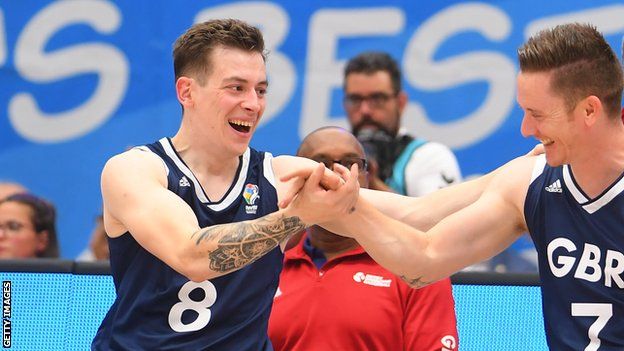George Bates: GB wheelchair basketball player says he may consider amputation option
- Published

George Bates was part of the GB team that won gold at the 2018 World Championships in Germany
Great Britain wheelchair basketball player George Bates says he may have to consider having his leg amputated to continue his international career.
The 26-year-old has been told that his particular disability makes him ineligible to play the sport.
Bates was injured playing football aged 11 and has complex regional pain syndrome - a condition that causes persistent severe pain.
"I have been deemed to be the 'wrong kind' of disabled," he said.
Bates made his senior debut in 2017 after a successful junior career and has gone on to win European and world gold with the GB team.
Wheelchair basketball's governing body, the IWBF, was told earlier this year by the International Paralympic Committee (IPC) that it needed to change its classification regulations in order to comply with the IPC's classification code.
The IPC warned that failure by the IWBF to act could result in the sport being removed from future Paralympics, including next year's rescheduled Tokyo Games.
International players are classified between 1.0 (most impaired) and 4.5 (least impaired), and the IPC required all 4.0 and 4.5 players to go through reclassification before Tokyo.
Leicester player Bates was originally classified as a 4.5 player.
"This condition has left me in constant pain for the past 15 years, as well as with reduced limb movement and muscle deterioration," he posted on social media.
"I will live with this for the rest of my life."
Bates said he chose not to have an amputation as a teenager, hoping for an improvement in his condition, but that has never happened.
Athletes who have a lower limb amputation are among those eligible to compete.
"Due to the decision of the IPC, I may now be forced to revisit this heart-breaking option," he said. "It will be a big thing for me to consider."
The Briton said he was considering appealing against the decision.
"It is ironic that the IPC - which attempts to base its brand around equality and inclusivity - is deliberately discriminating against athletes who don't meet its narrow-minded view of what it actually means to be disabled," he added.
In response, the IPC said in a statement that it had sympathy with Bates' situation but added its classification code states that complex regional pain syndrome is a health condition that does not lead to an eligible impairment to participate in Paralympic sport.
"All Paralympic sport is governed by the code, which was approved by the IPC's 200-plus member organisations in 2015," it said.
"Since its approval we have been working with all international federations to ensure they fully implement and abide by the rules of the code.
"This includes only allowing athletes from 10 different impairment groups to be eligible to compete in the Paralympic Games and international competitions. These 10 impairment groups were decided by the IPC membership in the lead-up to the approval of the code.
"The decision to find George non-eligible was taken by the IWBF, which was asked to reassess all 4.0 and 4.5 players by the IPC ahead of Tokyo 2020 to ensure it was aligned and compliant with the code."
Last month, Canada's two-time Paralympic gold medallist David Eng was told that his impairment meant he was ineligible to compete in the future.